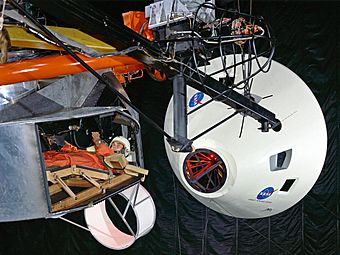Rendezvous Docking Simulator facts for kids
|
Rendezvous Docking Simulator
|
|

docking practice during Apollo program
|
|
| Location | Hampton, Virginia |
|---|---|
| Built | 1963 |
| Architect | NASA |
| NRHP reference No. | 85002809 |
Quick facts for kids Significant dates |
|
| Added to NRHP | October 3, 1985 |
| Designated NHL | October 3, 1985 |
The Rendezvous Docking Simulator, also called the Real-Time Dynamic Simulator, is a special machine at the Langley Research Center. It was built to help astronauts practice important space maneuvers. This simulator was very important for the NASA Gemini and Apollo space missions.
It was created in 1963 for the Gemini program. Later, it was updated for the Apollo program. The simulator cost about $320,000 to build.
Contents
What is the Docking Simulator?
The simulator looks like a large metal frame, called a gantry. This gantry has a moving part overhead. Spacecraft models were hung from this part using strong cables.
How it Moved
The simulator could move in many ways, just like a real spacecraft. It had a special joint called a gimbal. This joint used hydraulic power to tilt and turn the spacecraft model. It could change its angle quickly.
The gantry itself could also move. It worked like a giant overhead crane. Electric motors helped it move forward and backward up to 210 feet. It could also move side to side up to 16 feet. Plus, it could go up and down 45 feet. All these movements helped astronauts feel like they were really in space.
Why Was It So Important?
This simulator is the only one left from the Gemini and Apollo space programs. Astronauts used it to practice a very tricky skill: docking. Docking means connecting two spacecraft together in space.
Practicing for Space Missions
For the Apollo missions, astronauts needed to dock their command module with the lunar landing module. This was a super important step for returning from the Moon. If they couldn't dock, they couldn't come home! The simulator let them practice this many times. It helped them get ready for the real thing.
The simulator was also used with another training tool. This was called the Projection Planetarium. Together, these tools gave astronauts a realistic training experience.
A Piece of History
Because of its importance, the Rendezvous Docking Simulator was named a National Historic Landmark in 1985. This means it's a special place or item that tells an important story about American history.
Where is it Now?
Today, the simulator is stored inside Building 1244 at Langley. It hangs from the ceiling in a very large hangar. There are no current plans for it to be used again. It remains a silent reminder of the amazing space race era.
Images for kids
 | Selma Burke |
 | Pauline Powell Burns |
 | Frederick J. Brown |
 | Robert Blackburn |






